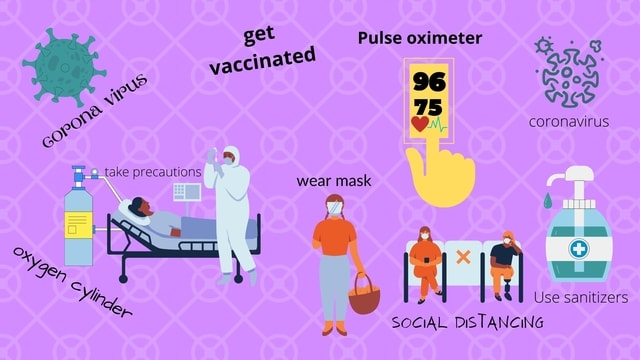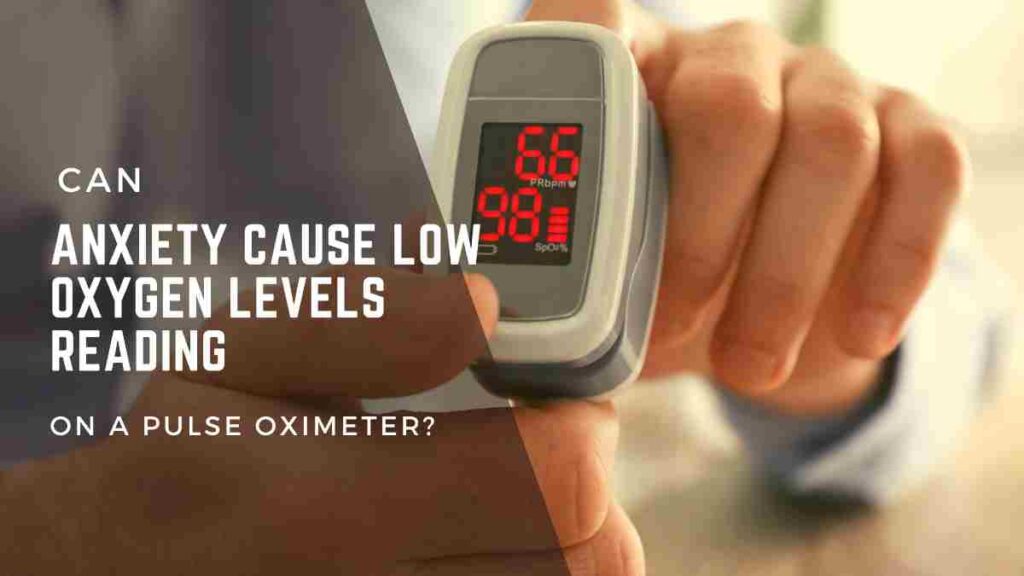The rise of the Covid-19 pandemic has affected society on many levels. The focus has been on preventing the disease from spreading and searching for the best possible treatment options and rightly so but we can’t neglect the psychological effects of Covid-19. Patients with Covid-related anxiety often describe having the feeling of not having enough air to breathe or not being able to get enough air into their lungs. Here we will discuss whether can anxiety cause low oxygen levels reading on a pulse oximeter.
When stressed, our shallow breathing is due to our body’s reaction which may contribute to decreased oxygen and result in low oxygen level readings on the pulse oximeter.
Table of Contents
What is anxiety?
It is excessive worry or fear about any known or unknown threat. Anxiety is therefore a stress-related disorder.

What is a pulse oximeter?
There has been a surge in panic buying of products such as pulse oximeters, nebulizers, and oxygen concentrators in the market in the recent coronavirus pandemic.
The pulse oximeter is a small clip-like device that can be attached to a finger. A pulse oximeter helps in measuring the level of oxygen. It is a non-invasive and painless device. It shows how well the oxygen reaches the farthest parts of your body like your arms and legs.
The ideal device reading should be around 95 percent to 99 percent. It should tell the oxygen saturation levels as well as the heart rate. Immediately consult a doctor if your pulse oximeter levels drop below 94 percent.
The proper use of a pulse oximeter depends on the following
- Keep a check on the battery of your oximeter. If the battery has depleted or weakened the readings may not be accurate.
- Once placed on the finger, do not move or squeeze your hand, arm, fingers, or oximeter.
- In case it is showing wrong readings or not showing correct readings. Remove and then place it on the middle finger again.
Method to use an oximeter
- Do not place the nails with nail paint inside the oximeter.
- If your hands are cold then before placing those inside an oximeter warm them by rubbing them together.
- Stay still and rest your hand on your chest at heart level
- Slowly place the oximeter on your index or middle finger.
- The readings initially fluctuate a little but get stable after 20-30 seconds.
- The results that remain constant for 5 seconds should be noted.
- The reading should be taken 3 times a day even if you are a patient who has no severe symptoms and is home quarantined.
Can anxiety cause low oxygen levels reading on a pulse oximeter?
A pulse oximeter showing normal oxygen saturation helps in confirming if the shortness of breath is related to anxiety or Covid-19.
Blood oxygen level and anxiety
Can anxiety cause low oxygen levels? The answer is no anxiety attack or panic attack will not lower oxygen saturation level readings on a finger pulse oximeter immediately but if a person hyperventilates for a very long time then it may lead to carbon dioxide wash out and carbon dioxide is a must for the respiratory center then there is a possibility that pulse oximeter may show lower oxygen levels. It may or may not happen depending on the severity of continued hyperventilation.
An anxiety attack or panic attack causes shortness of breath and hyperventilation. It causes breathing that is much deeper and more rapid than usual. When the healthy balance between breathing in oxygen and breathing out carbon dioxide is disturbed then there is a rapid reduction in carbon dioxide levels in the body. This makes your body’s pH levels rise leading to respiratory alkalosis making you feel light-headed and have a rapid heartbeat.
The patients with panic-induced hyperventilation should have a pulse oximeter reading above 95 percent and if it is lower than that then administer supplemental oxygen.
Can stress cause low oxygen levels?
Stress makes the body tense. Hypothalamus then releases stress hormones, thus triggering the body’s fight and flight response. This increases heart and breathing rates and also readies muscles for action. Making breathing shallow and fast, causing low oxygen levels in the blood. This is again sensed by the brain as stress and thus the cycle continues.
Some tips that help in coping with anxiety during Covid-19s
- Taking care of yourself
Take care of your health by following the expert guidelines for safety and health.
- Stay informed but don’t obsess
Nowadays every news channel is showing news related to deaths due to covid-19. If this news is making you feel anxious, just watch the headlines. Don’t get obsessively engrossed in checking the news.
- Be kind to yourself
If you are feeling anxious try and accept your emotions it is important to be kind to others but it is very important to be kind towards yourself too.
- Divert your attention
Don’t try to fight with your anxious thoughts just calmly let them be instead try to do things that make you calm. For example, if gardening helps during lockdown then do that. Some find cooking therapeutic.
- Try not to focus on things that are beyond your control
In times of pandemic you can’t control the coronavirus outbreak in your region but what you can do is, take precautions that will help in the prevention of it.

– Wash hands for at least 20 seconds.
– Staying home as much as you can
– Avoid crowds and social gatherings and functions
– Don’t start panic buying and unnecessarily go shopping and get exposed to the virus.
– Exercising at home and doing yoga
– Maintaining a distance of 6 feet between you and anyone else you meet.
- Stop focusing on “What if’s”
What If I was hospitalized due to coronavirus? Can being on a respirator cause anxiety? Try to focus on the here and now, avoid getting trapped in the spiral of “what if” but try to focus on “what I can do”. The easiest way to do this is to focus on your breathing. Slowly breathe in and out. breath from your belly. This will help in bringing your mind back every time it drifts, making you feel calm.
- Even if in isolation be in touch with friends and family
Human beings are social animals. For our mental well-being, we need to socialize and stay connected through video calls and social media. The lock-down isolation or home quarantine can cause anxieties to exacerbate. Try to have normal conversations over the phone or Zoom dates or even Facebook chatting. It is important to have a good laugh, share good stories and spread overall positivity in these dark times of pandemic.
Disclaimer
The content of this article has been developed by third-party medical content writers and/or experts. The information mentioned in the article is only for educational purposes and therefore it is requested to consult a doctor/ physician before diagnosing and deciding the treatment plan.
Consent
By using our website, you hereby consent to our disclaimer and agree to its terms.
Dr Amit Sharma is a Doctor and writer with a particular interest in mental health. He helps individuals by combining practical advice with emotional support.
